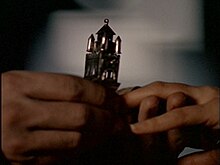| "Kaddish" | |
|---|---|
| The X-Files episode | |
 The ceremonial Jewish ring. The ring was a real Jewish relic owned by a rabbi who survived the Holocaust, and was used to wed two of Howard Gordon's friends. This later inspired him to write the episode. | |
| Episode no. | Season 4 Episode 15 |
| Directed by | Kim Manners |
| Written by | Howard Gordon |
| Production code | 4X12 |
| Original air date | February 16, 1997 |
| Running time | 44 minutes |
| Guest appearances | |
| |
"Kaddish" is the fifteenth episode of the fourth season of the American science fiction television series The X-Files. It was written by producer Howard Gordon and directed by Kim Manners. The episode originally aired on the Fox network on February 16, 1997. The episode is a "Monster-of-the-Week" story, a stand-alone plot unconnected to the series' wider mythology, or overarching history. The episode received a Nielsen household rating of 10.3 and was viewed by 16.56 million viewers. It received moderately positive reviews from critics.
The show centers on FBI special agents Fox Mulder (David Duchovny) and Dana Scully (Gillian Anderson) who work on cases linked to the paranormal, called X-Files. In the episode, Isaac Luria (Harrison Coe), a Jewish man, is killed by a group of teenagers working for a racist shop owner. One of the assailants, however, is soon strangled to death and the fingerprints on his neck are Isaac's. Despite other factors, Mulder becomes convinced that a golem is attempting to avenge Isaac's murder.
"Kaddish" was written by Gordon due to his fascination with the legend of the Golem from Jewish folklore. Originally, the script called for the antagonist to be an African American "Louis Farrakhan-like" character, but Fox was concerned that the show's increasing popularity with black viewers would be damaged by this, and Gordon agreed to make the villains into, in his words, "cartoonish neo-Nazis". Gastown, Vancouver stood in for many of the exterior shots that were supposed to be Brooklyn. No Jewish synagogue would rent out their space for the episode, so Shaughnessy Heights United Church was renovated to look like one. This included completely redecorating the pews, carpet, and light fixtures, as well as crafting a Jewish altar. The episode's title is a reference to the Jewish mourning prayer service (Hebrew: קדיש). "Kaddish" has been critically examined for its themes concerning love and hate.
- ^ Meisler (1998), pp. 124–131.